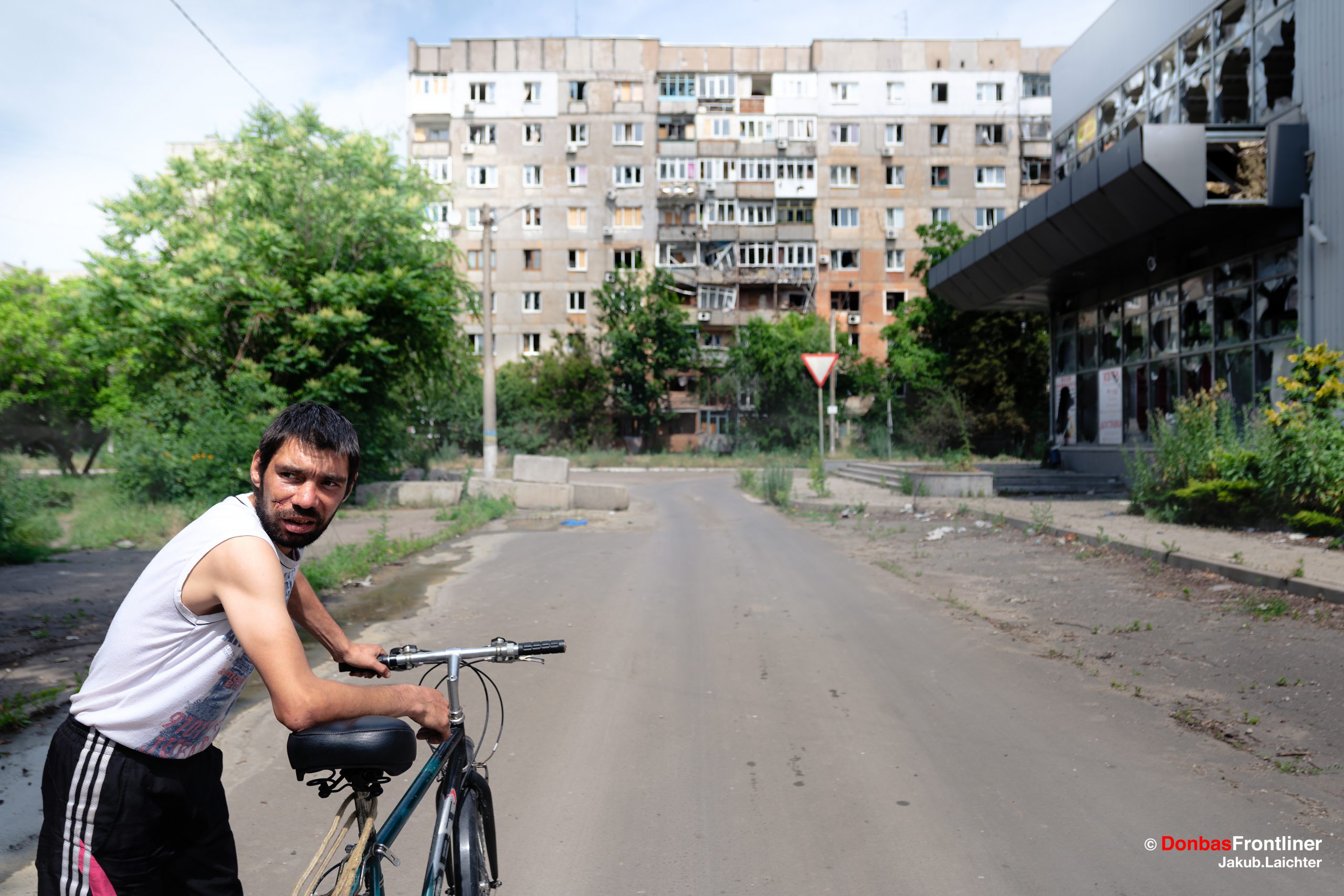
Avdiivka, Ukraine – After being treated for near-fatal wounds from a shell explosion at the hospital in Myrnohrad, Viktor made up his mind and walked 50 kilometers back to his besieged hometown, Avdiivka. He casually points to scars on his legs, torso and even face. His body is marred by shrapnel wounds. However, that’s nothing unusual among the people who live as close to the frontline as Viktor. Many of the remaining civilians refuse to evacuate despite their critical injuries.
Since the full-scale invasion began a year ago, Russian artillery has demolished Viktor’s hometown of 35,000 people to a point where not a single building is left undamaged. Despite the critical situation, approximately 1,600 civilians remain and refuse to evacuate in defiance of official warnings and the deadly shelling. All essential services collapsed months ago, dozens of shells land daily in residential areas and civilian casualties mount every week.
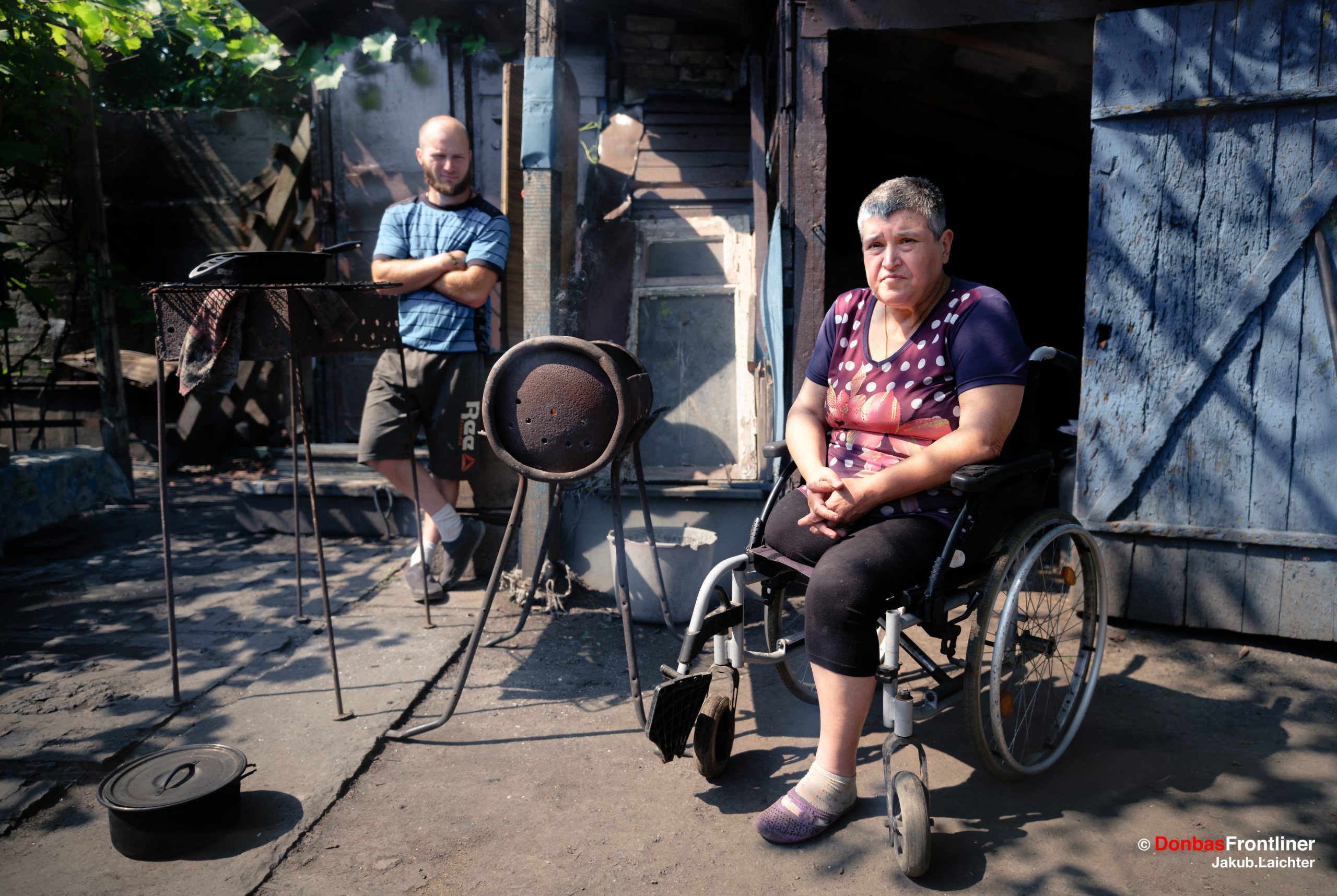
Iryna
“I was preparing food here,” Iryna points to her vegetable garden a few meters from where she is sitting in her wheelchair. “Then there was an explosion. I remember lying on the floor and seeing red in front of my eyes. I tried to grab my leg, but my hand went straight through the wound,” says Iryna, wiping tears that well up in her eyes.
Her son, Ruslan, seen in the background of the photo above, was nearby and got Iryna help. “I lost a lot of blood, and my face swelled up. It turned blue and black by the time I reached the hospital,” she says.
“When the doctor told me he was going to cut off the remains of my leg, I wasn’t upset. I only asked my son whether he was going to stay with me and care for me. When he said yes Mom, I knew it was going to be alright,” she says.
“I remember seeing the saw going through my flesh, and then my leg was gone. Life is a little more difficult now, but I had no doubts about returning home to Avdiivka. Where else would I go? So I lost my leg. People get hurt, and that’s how life goes here. I will not stop living, even in a wheelchair,” Iryna says, smiling.
After more than a year of constant shelling and isolation from the rest of Ukraine, many of the remaining locals can’t quite imagine their life any other way than it is now. Like many others in Avdiivka, Iryna mistakenly believes that the danger she and her son face in Avdiivka is similar to what the rest of Ukraine experiences. “I would rather get hit by a shell here than in some town I don’t even know,” Irina says. In Avdiivka, life without running water or electricity and with near constant threat of shelling is difficult, but for Irina, evacuation from Avdiivka is a leap into the unknown, which she fears more than the harsh reality she needs to endure in her hometown. “For months, they have been saying that Avdiivka is nearly encircled. I don’t want to hear about it. I was born in this house and I will be here until the end,” says Iryna.
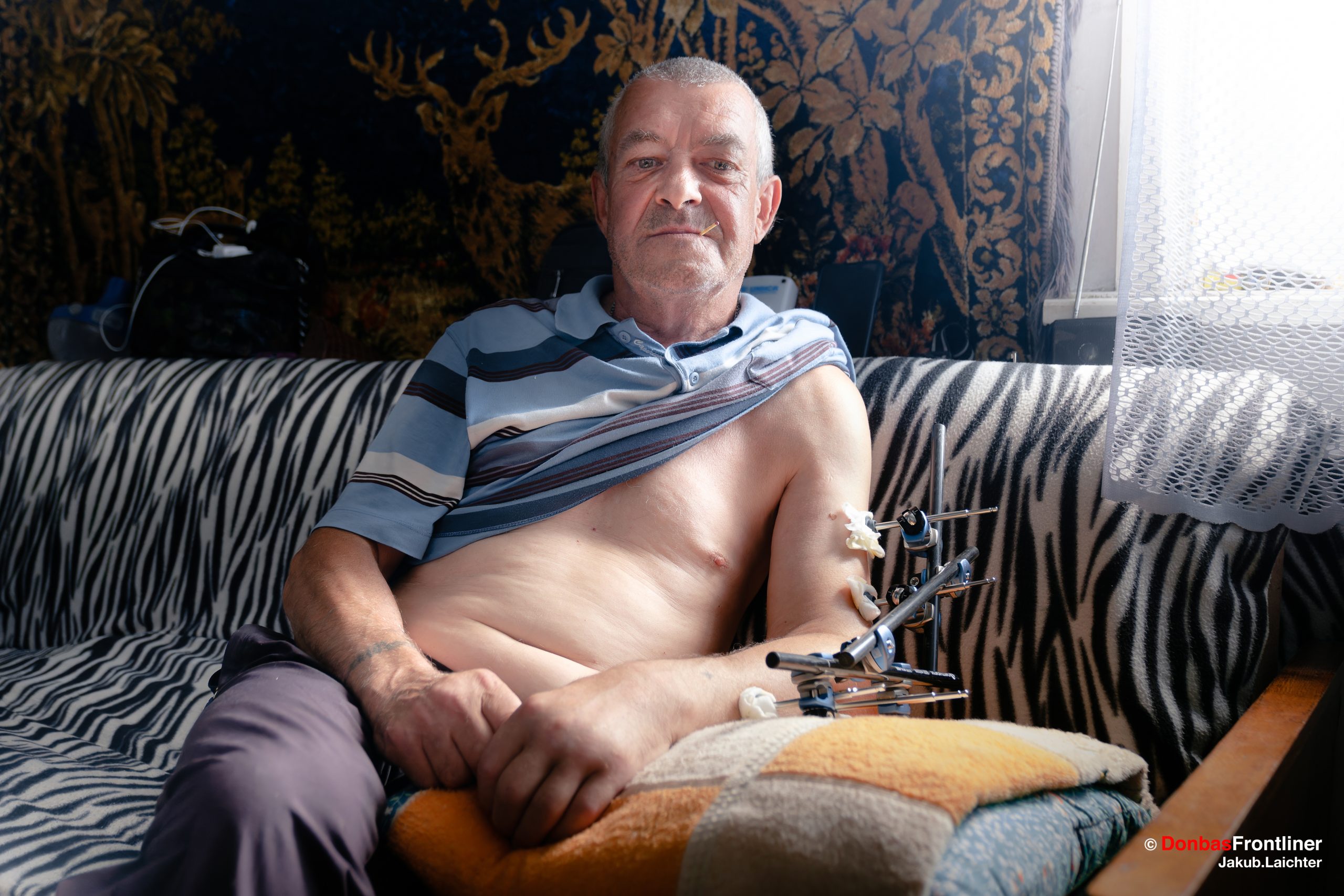
Sasha
“The rockets were falling all around. Several houses on our street were burning, and I ran out to the street to see whether my neighbors were alright. Then another rocket hit. I remember sharp heat drilling through my skin and fire in front of me. Next, there was blood all over my hands,” recalls Sasha, as he sits in his kitchen with his wife while the rattle of assault rifles sounds from outside. They live on the very edge of Avdiivka. Only 500 meters of Ukrainian-controlled forest lies between their house and the first advanced Russian position.
“My wife saved me that night, but I don’t remember what was going on after I got hit,” Sasha says, and his wife starts recounting the rest of the evening, “It happened at 10 pm. It took eight hours before the military came and evacuated him [Sasha] to the hospital. He got an open fracture. Part of his elbow was missing, and the bones were sticking out of the wound. I tried to stop the bleeding, but he was losing a lot of blood and kept losing consciousness,” she says.
In the hospital, doctors wanted to cut Sasha’s arm off, but he refused in the hope that he might get a surgery that would save his hand. Now two months have passed. Sasha has a long recovery ahead of him. The odds of keeping his arm without proper treatment are grim. In the past few weeks, the pain has heightened. Sasha has a hard time falling asleep and can’t move his fingers.
“We try to get some milk so the bones heal faster, but we can’t afford it,” says Sasha. While obtaining food or water is difficult in Avdiivka, finding proper medical care for the remaining residents is impossible without leaving the town. Sasha would need to travel 50 kilometers to the nearest hospital in order to get an X-ray, but attempting to leave the town is dangerous. Moscow’s troops have taken control of one of the two primary access routes and neighboring villages, enveloping Avdiivka from its north, east, and south sides.
“The shelling never stops. Only a few hours ago, a grenade hit our house,” says Sasha and points towards a wall that got cracked by the explosion. “Sometimes, I think this is bad, but then I remember Chornobyl. I was sent there as a liquidator [to clean up debris after the catastrophe]. Life was never easy. Why should it get any better if I leave now? Here, I have at least a roof over my head. I have my wife and my neighbors, and we are here for each other. No one needs me elsewhere.”
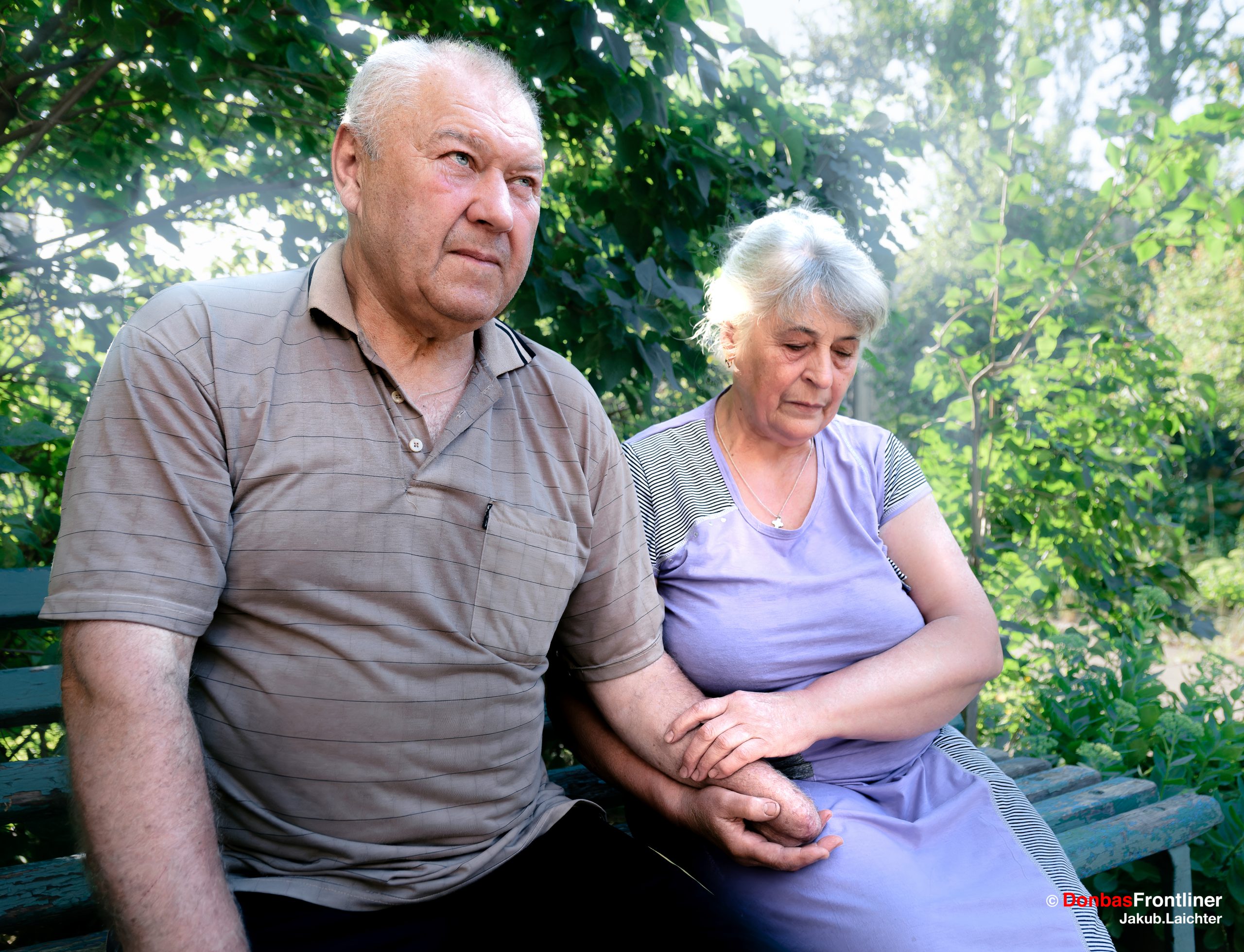
Valerii
The ruined building above Valerii’s cellar was once his home. He walks out to the street with a bowl full of bread crumbs in his right hand. “I wonder where all the pigeons went,” Valerii says, scratching his forehead with what remains of his left arm. He looks above and points with his mutilated arm towards one of the shattered windows. “There is one,” he smiles. “People left or moved to their cellars, and pigeons moved to their flats. Pigeons are good neighbors, better than rats,” he says.
Valerii lost his hand one month into the full-scale invasion.
“I went out to get some water. When I walked to our well, my dog started barking, and then I heard a whistle. Next, I was deafened. I did not understand what happened. I just saw my hand in pieces,” recounts Valerii while he throws the bread crumbs over the asphalt. He sits down on a bench, waiting for the pigeons to come down.
Blasts echo through the deserted street, but Valerij does not react to the sounds. He does not look up when the drone buzzes over his head nor looks towards the armored vehicle that roars by at the end of the street. In Avdiivka, the sound of combat never quiets down. For most of the remaining residents, it has become a mere background noise. “There’s no point worrying about the shelling. If you get hit, you either die or you don’t. You can’t do anything about it. It’s like walking in a storm and worrying that you might get hit by lightning. It’s a waste of time,” he says.
Valerii and his wife Jevhdakia were several times offered to evacuate but declined .
“Our children are worried for us. Sometimes they sent us some food. They would like us to leave because they think we are going to die here, but I think we are going to live,” says Valerii. He says he’ll remain in Avdiivka as long as he can. Local volunteers that try to convince the remaining civilians to evacuate say that this sentiment is shared by many others who remain in Avdiivka. Their concern is that by the time civilians like Valerii decide to leave, it might be too dangerous to do so.
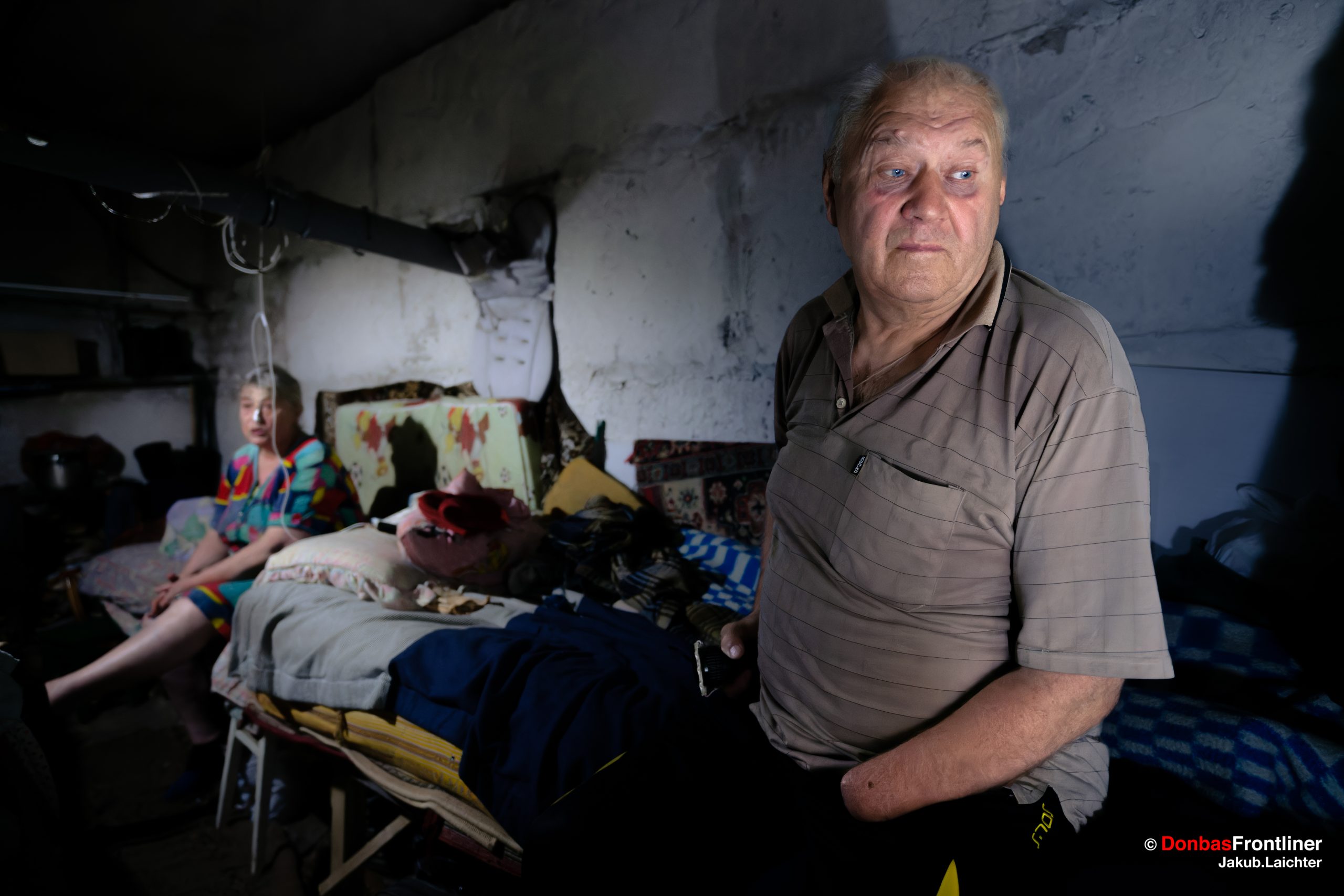
Author: Jakub Laichter